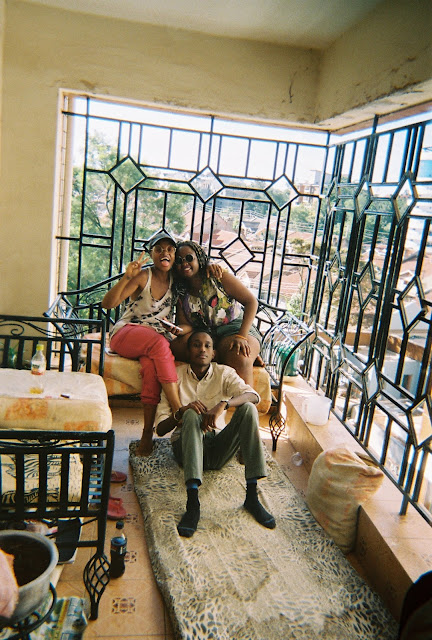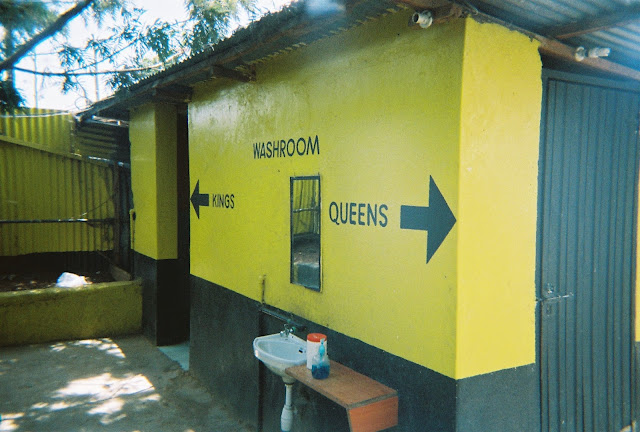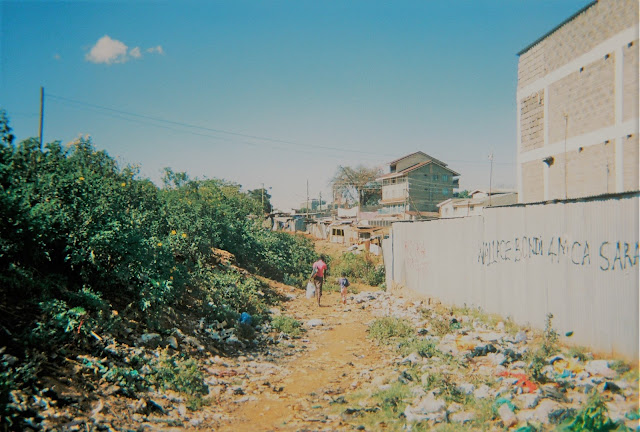Do you believe in magic?
If not, why?
Think about it: When we’re sick, we can be cured. We fly in metal boxes across Earth. We talk to people wherever we are, whenever we want.
We’re relatively close to setting up human colonies in outer space – and becoming the first known species to outlive its own planet.
If this is possible... what else is possible?
We define ourselves by aiming higher, breaking barriers, reaching for the stars. And we’ve barely begun. You just know, with 100% certainty, that our greatest accomplishments are in front of us, not behind us. Because however slow and pathetic we may seem, and however many setbacks we have, we are progress.
We can, and will, do so much better than this. We’ve proved it throughout history.
I spent a fortnight living with people across Nairobi, and on a camping safari in Masai Mara National Park.
Sure, parts of it were devastating. No amount of Comic Relief can prepare you for seeing children sleeping rough alone, women filling up barrels of dirty drinking water from open pipelines, and men pulling overloaded goods carts through smoky rush-hour traffic.
Then there’s the smell of sewage, the rivers of trash, the tin roofs and walls made of old newspaper. The dust clouds that rise violently over untarmacked roads... and lots of other pretty grim developing world problems.
I thought that was going to be the story I told you. It might have been called something like ‘My Live Aid Moment’.
But that would have been arrogant, insulting, and worst of all, it wouldn’t have been true.
Instead, what was and is true is the sense of hope I found there, which I’d never felt before.
Lingua Franca
Here’s a bit about that.
Titus, who lives in Nairobi’s troubled Eastlands area, shared a one-bedroom house with no running water, toilet or kitchen, with two other people.
He told me: “Negative thoughts attract negative events. Positive thoughts attract positive events. So when I really, really want something to happen, I think about how I will feel, and what I will tell my friends and family, when it does happen. I completely visualise it. Then sometimes, the universe makes it happen for me.”
I asked him what kind of positive events he’d wished for.
He said: “I wished for my mother to get better in hospital. I wished for my younger brother to pass his school exams. And I wished for Liverpool to win the Premier League.”
And did these things happen?
“All apart from Liverpool...”
Like everywhere across the world, there’s a pretty big gap between the have-nots and the have-yachts in Nairobi.
It didn’t seem fair, because it isn’t. It demonstrably isn’t.
But Titus, in his humble home, told me he’d rather be rich in his mind: “because you can’t lose that, but you can lose money.”
With crippling guilt I thought about him as our Westlands host poured us his favourite French chardonnay.
Ying and Yang
The worst place I went was Nairobi’s Kibera area – the largest urban slum in the whole of Africa. It’s basically one huge market, where people earn their living haggling over baby clothes and mangoes, and then go home to pray. The ground is rocky, and it smells like burning trash.
I spent an afternoon there.
The guy who showed me around was called Peter. He was proud of Kibera. He’d lived there five years.
“This is the nice area,” he said, gesturing at the street ahead of us.
Without going into too much detail, it wasn’t. But the fact he thought it was made me both happy and sad. Ying and Yang.
Peter used to make a living in Kibera selling clothes, before starting a new job as a guard somewhere else in Nairobi.
“You know, I’d really like to improve my life,” he said. “But I’m happy everyone here knows me and I know them. They like me and I like them. It’s good!”
He later told me he wanted to get back to what he does best: selling, and talking to customers.
He wants to build his own business and, shilling by shilling, I really think he’ll make it happen. Because he has the Kenyan spirit.
Wherever I was in Nairobi, children tended to gawp at me, a rare sight of a white man. They’d come up to greet me, ask me questions, or try to hold my hand – their tiny palms gripping my fingers.
It was no different in Kibera. Peter and I stopped off for a soda on our way out of the area, when a young girl came up to me in the room we were sitting in.
She stared for a while, then hid behind a barrel and played peek-a-boo. Her name was Carolyn. I remember talking to her about why she should stay in school and work hard.
Then her dad came over.
He backed me up in the rhythms of Swahili, telling his daughter that eventually, she might be able to get a good education that would take her “to the UK, or America”, he said, too old to dream that for himself.
Who knows, maybe Carolyn will become something really big some day. A lawyer, a teacher, an entrepreneur... or just someone who makes Kibera a better place, one soul at a time.
Police corruption, tribal tension
Poverty isn’t the only issue in Nairobi.
The police aren’t paid enough, so many are corrupt. I was looking for somewhere that did currency exchange in Downtown, and got called over by a guy wrapped in a camouflage suit and an AK-47. He called me out for not carrying my passport, which is apparently an offence.
The passport was at my host’s place in Fedha, so the policeman said he was going to take me to the police station.
After a while I thought I’d managed to talk him around. Then he told me to follow him. We walked for about 20 minutes, and with every step I was more confused where I was being led. But what could I do?
We ended up at a casino, where I could exchange currency. He took a pretty hefty cut of my shillings, then left me alone. That actually happened on my first day in Nairobi.
There are 42 ethnic groups (or tribes) in Kenya. There’s sometimes tension and conflict between them – especially in election years, like 2017.
Kenya’s a multi-tribal jigsaw, and its politicians use the gaps in the pieces to divide and rule. It’s an approach they learned from us when we were the British Empire.
Even today we’re not much better, with our governments contributing largely to the fact that Africa has more weapons than any other continent – despite manufacturing none themselves.
The universe
But you know what? I had an awesome time in Kenya too. This was in no small part due to living in Nairobi’s creative community, chilling out with a fashion designer, photographer, the best singer I’ve ever heard, and their many friends.
We partied on their balcony, visited an art gallery, and spent a random night watching The Fantastic Mr Fox, featuring the voice of George Clooney.
And there was even more optimism. More energy. More life.
Sama was a painter who’d recently quit her job doing “corporate art” to make a living doing more creative projects.
She said: “Have you ever been sat on a park bench and had the sudden urge to leave, for no reason? What is that? It’s something beyond our control. I think it’s the universe!”
Later:
“Love is something that’s real. We can’t explain it scientifically, but it’s powerful, and we feel it. Maybe it’s some evidence of a higher force we don’t understand but we know is real. And it feels right to trust it, doesn’t it?”
I still think about what she said, even now I’m back home and in my own bed.
Singing, dancing, celebrating, thrillseeking, hoping, praying, dreaming.
Maybe it was just these extraordinary people I met, but I’d like to think they are a decent sample of what Nairobi’s all about.
Mixed in the dust clouds there’s dignity, spirit and joy.
And then the animals
I stayed a few days in Masai Mara National Park, home to the ‘Big Five’ wild animals: lions, elephants, leopards, buffalo and rhino.
Me and my safari group didn’t see any rhino, but our jaws were open all day seeing everything else: cheetahs chasing wildebeest at full speed, giraffes munching on trees, lions just li-on around.
The celebrities of our zoos and Attenborough TV shows were just going about their business in their own stomping ground – and I was star-struck.
One day we raced across the park watching wild animals in a rickety Jeep type-thing, met and danced with a Masai tribe in a local village, and compared stories of extremes while watching the sun set.
We spent the night in our tents during a storm. It was pitch black, and every raindrop’s strike to the canvas seemed to swell somehow, as the distant thunder rumbled and the grasshoppers chirped.
It was a Wednesday, and the first and only day I’ve thought: Wow, this might just be the best day of my life so far.
It was kind of, I don’t know... magical.
———
Click here for more Travel
Click here to follow clarkspeak on Twitter

















































